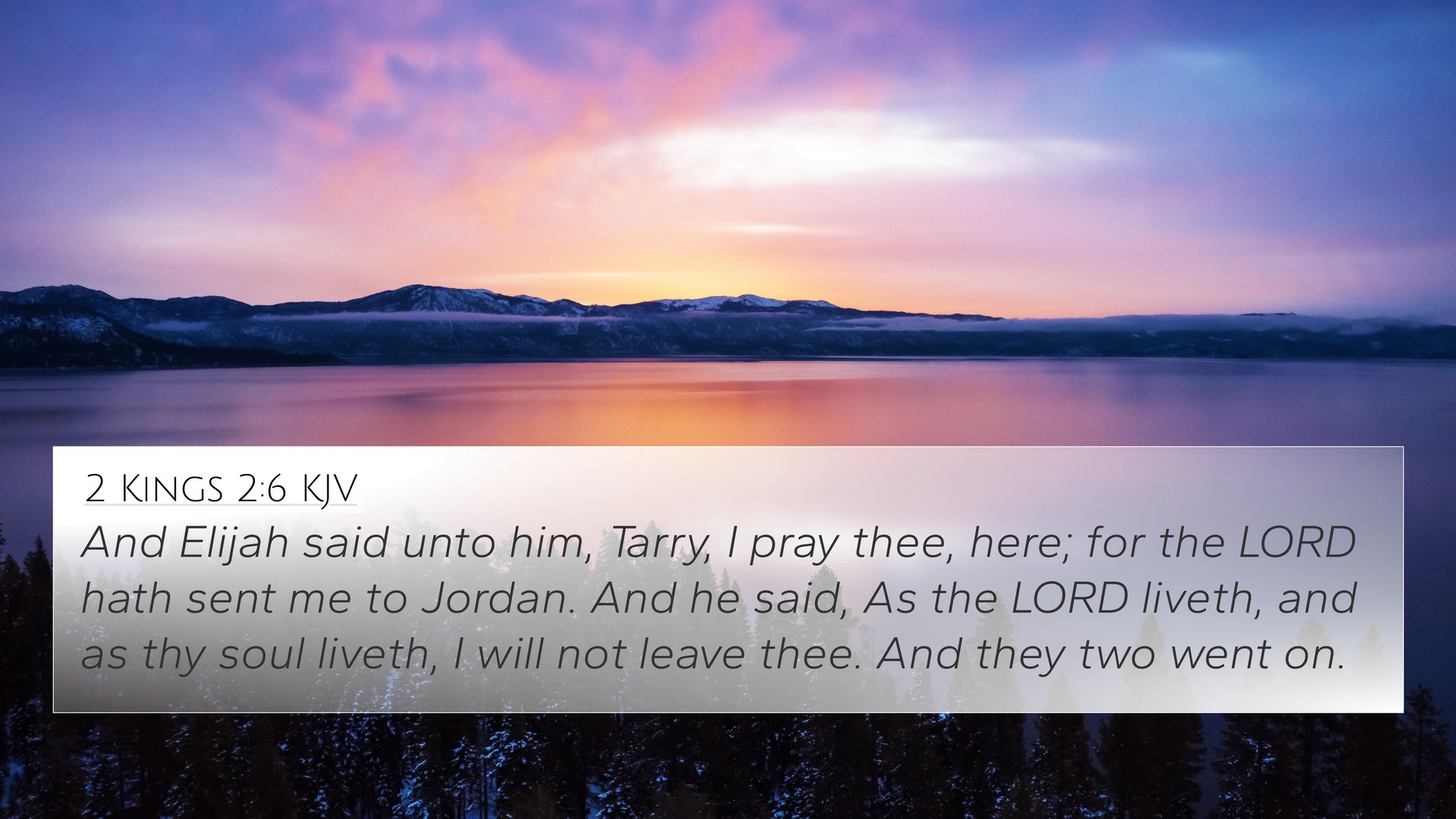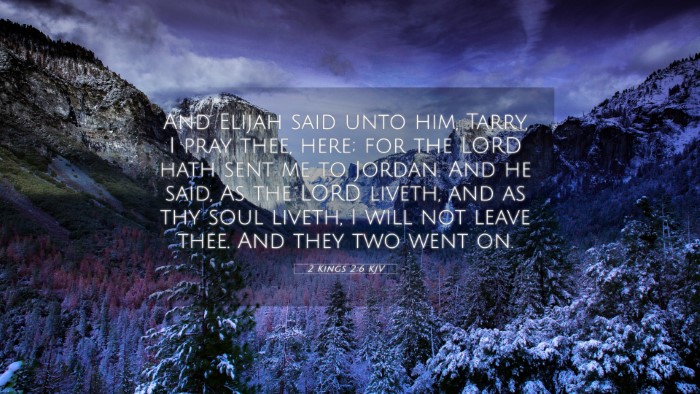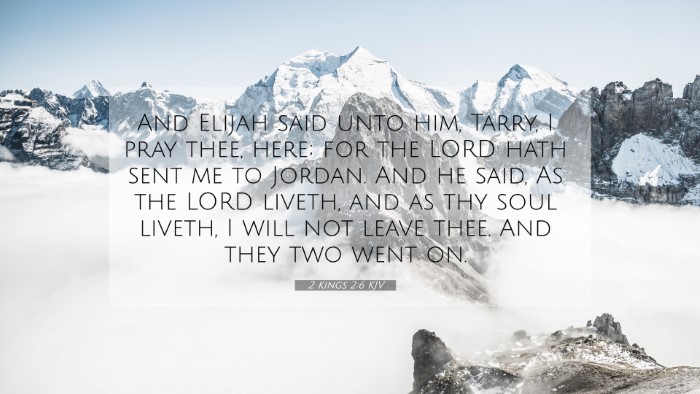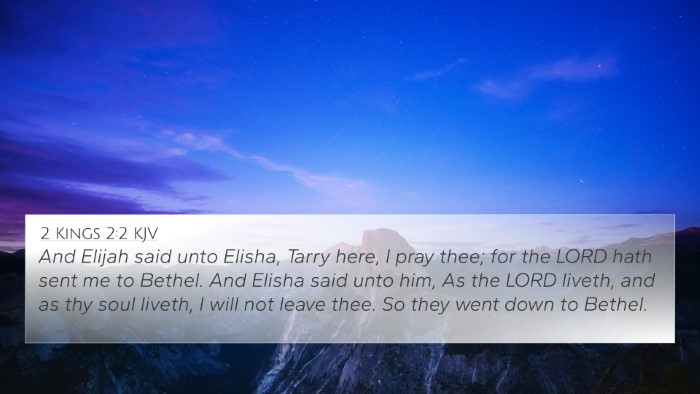Understanding 2 Kings 2:6
Verse (2 Kings 2:6): "And Elijah said unto him, Tarry, I pray thee, here; for the Lord hath sent me to Jordan. And he said, As the Lord liveth, and as thy soul liveth, I will not leave thee. And they went on." This verse depicts the profound relationship and commitment between Elijah and Elisha as they journey together towards a significant moment in biblical history.
Interpretation of the Verse
This verse is significant in the narrative of Elijah and Elisha. As Elijah prepares to be taken up into heaven, he tests Elisha's commitment by asking him to stay behind. Elisha’s unwavering response illustrates loyalty and dedication, essential themes throughout the Scripture.
Insights from Public Domain Commentaries
-
Matthew Henry:
Henry emphasizes the testing of Elisha’s faithfulness. This moment reveals Elisha's deep sense of attachment and obligation to his mentor. It serves as a metaphor for the commitment required in the ministry and the journey of faith.
-
Albert Barnes:
Barnes points out the pattern of prophetic succession evident in this passage. Elisha’s refusal to leave Elijah signifies a resolute spirit in seeking God's purpose and a prophetic calling, showing us the importance of perseverance in spiritual pursuits.
-
Adam Clarke:
Clarke discusses the geographical significance, noting that Jordan symbolizes the transitional phase between the wilderness and the Promised Land. Elisha's decision to follow reflects a commitment not only to Elijah but also to the divine mission that lay ahead.
Thematic Connections
The theme of loyalty and commitment is a vital biblical principle illuminated through this verse. It also aligns with several other instances in Scripture where followers demonstrate unwavering dedication to their leaders and God’s calling.
Bible Cross-References
This verse connects with a number of other passages throughout Scripture, enhancing the understanding of commitment and fidelity:
- 1 Kings 19:19-21: The calling of Elisha as a prophet and his immediate willingness to follow Elijah.
- 2 Kings 2:1: The moment when Elijah is taken up into heaven, marking a pivotal transition in leadership.
- Ruth 1:16: Ruth’s pledge of loyalty to Naomi exemplifies similar loyalty found in Elisha’s relationship with Elijah.
- Luke 9:62: Jesus speaks on the necessity of commitment to the Kingdom of God, reflecting Elisha’s dedication.
- Matthew 10:37: The call to prioritize loyalty to God above all else aligns with Elisha’s commitment to Elijah.
- Philippians 3:14: The pursuit of a higher calling resonates with Elisha's decision to follow Elijah to the end.
- John 15:15: Jesus speaks of friendship with his disciples, echoing the deep bond between Elijah and Elisha.
Conclusion
2 Kings 2:6 reflects essential biblical themes such as loyalty, mentorship, and the pursuit of divine purpose. Through the study of this verse, one can appreciate the deep connection between Elijah and Elisha and recognize how their journey signifies the broader spiritual call for believers to remain steadfast in their faith journeys.
Tools for Understanding and Application
For those seeking to delve further into biblical insights, utilizing tools for Bible cross-referencing can enhance understanding:
- Bible concordances to find specific terms and their contexts.
- Bible cross-reference guides for systematic study.
- Cross-referencing methods to explore thematic connections between verses.
- Bible chain references for tracing related topics throughout the Scripture.
How to Use Bible Cross-References
Understanding how to find cross-references in the Bible can deepen one’s study. One can identify connections between the Old and New Testaments, analyze parallels, and uncover thematic links that enrich one’s spiritual learning and application.
Final Reflection
As you study 2 Kings 2:6, consider how Elisha’s choice serves as a model of faithfulness for your own life. Through cross-referenced examples, may you find the strength to stay committed to what God has called you to, just as Elisha did.




